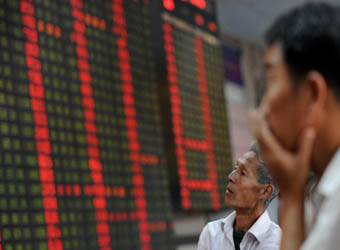Asia markets mostly rose Monday morning, with investors’ risk sentiment likely improving from Friday’s better-than-expected U.S. jobs number as they await to hear Pyongyang’s response to U.N. sanctions over the weekend.
The United Nations Security Council unanimously imposed new sanctions on North Korea on Saturday over its intercontinental ballistic missile tests in July. Reuters said the sanctions could slash the reclusive regime’s $3 billion annual export revenue by a third.
Some analysts, however, said it is unlikely that the sanctions could deter leader Kim Jong Un from pursuing his nuclear weapons ambitions.
In Australia, the ASX 200 climbed 0.86 percent in morning trade, with the energy and materials sectors gaining 1.01 and 1.6 percent, respectively. The heavily-weighted financials subindex rose 0.98 percent.
Shares of Commonwealth Bank reversed early losses of more than 0.8 percent to trade up 1.12 percent. The bank said a “coding error” on the software was responsible for the “vast majority” of anti-money laundering law breaches it was accused of last week by the Australian Transaction Reports and Analysis Centre. Commonwealth Bank said it will file a statement of defense and that it does not “intend to litigate this matter publicly.”
Commonwealth Bank said it will file a statement of defense and that it does not “intend to litigate this matter publicly.”
Shares of other major banks Down Under also rose: ANZ shares climbed 0.98 percent, Westpac was up 1.3 percent and the National Australia Bank added 0.84 percent.
Major Australian miners also advanced, with Rio Tinto shares up 2.04 percent, Fortescue adding 2.45 percent and BHP Billiton climbing 2.26 percent.
Japan’s Nikkei 225 rose 0.58 percent, and the Topix index was up 0.55 percent. Across the Korean Strait, the Kospi was up 0.53 percent. In the Greater China region, Taiwan’s benchmark Taiex index was up 0.48 percent, while Hong Kong’s Hang Seng index rose 0.44 percent.
Mainland Chinese shares traded mixed; the Shanghai composite bucked the general upward trend to trade down 0.15 percent and the Shenzhen composite added 0.39 percent.
Elsewhere, the dollar index, which measures the greenback against a basket of currencies, traded at 93.372, rising from levels below 92.800 late last week. The dollar received a small boost on Friday, following the jobs report — the U.S. economy added 209,000 jobs in July, according to the Labor Department. That was well above the expected gain of 183,000.
The record closing of the Dow Jones industrial average, alongside the strong jobs number, last week was a “warning shot to die-hard dollar bears,” Mizuho Bank senior economist Vishnu Varathan said in a Monday note.
Among other currency majors, the Japanese yen traded at 110.65 to the dollar at 10:17 a.m. HK/SIN, weakening a touch from levels near 110.00 in the last week. Major export stocks were higher in morning trade: Toyota was up 2.17 percent, Nissan added 0.64 percent and Mitsubishi Electric gained 0.84 percent.
A weaker yen is seen as a positive for exporters because it increases the value of overseas earnings when they are translated back into their home currency.
Toshiba shares, meanwhile, surged 6.25 percent after reports cited the Nikkan Kogyo Shimbun newspaper that said the troubled conglomerate’s auditor will sign off on its financial results for the year ended March.
Elsewhere, the Australian dollar traded at $0.7941 and the euro was at $1.1796.
Oil prices were a touch lower Monday morning Asia time, with U.S. crude trading down 0.1 percent at $49.53, while global benchmark Brent was down 0.06 percent at $52.39.
Source: CNBC


